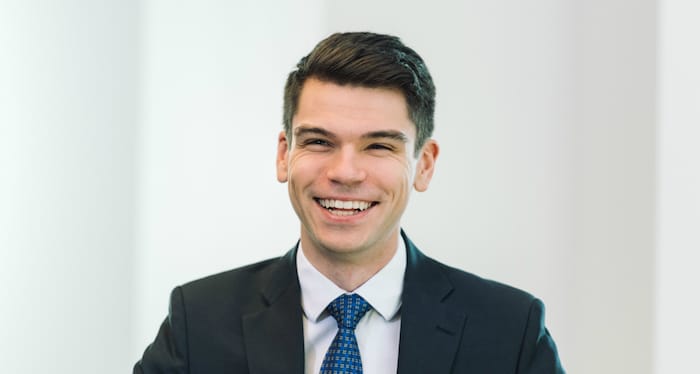Bristows associate Erik Müürsepp shares his career journey and advice to students, ahead of his appearance at tomorrow’s virtual careers event

In 2013, Erik Müürsepp, then a masters student studying molecular biophysics at King’s College London, had a discussion with a university careers advisor that put him on the road to where he is today. The careers advisor suggested that entry to the world of patents and intellectual property (IP) via a legal career could help combine Müürsepp’s life sciences expertise and enthusiasm with playing a part in the development of treatments for disease.
Up until that point, Müürsepp, who’d previously graduated with a first from the University of Bristol in biochemistry, had thought that a career as a lab-based researcher was his only feasible option. But during his masters he’d begun to wonder if lab-based research was really for him.
Part of any scientific endeavour, Müürsepp tells me, is uncertainty. There are “no guarantees of successful results, and success is not dependent on how much work you put it in”. Although negative results are useful for the scientific community, Müürsepp found it “a bit too discouraging”. However, he still wanted to be in the fast-moving life sciences field, even if he wasn’t doing the lab-based research himself.
But in the law surrounding patents and IP more generally Müürsepp could see an area where an understanding of the exciting inventions that people were seeking to protect would be of great benefit and one could act as a trusted commercial advisor to the innovators who weren’t disheartened by the uncertain nature of scientific research. With some understanding of the huge expenditure that research and later development entails, he was interested in how IP protection could incentivise innovation and make it sustainable.
From there, Müürsepp decided to look for the firms that not just excelled in IP law, but also had a strong focus on the life sciences sector and had good connections within that industry. In all of this research, and the conversations he’d had, Bristows came out on top. The Bristows’ Winter Workshop that he attended further cemented that decision as half, if not more, of the Bristows lawyers that he spoke with had STEM backgrounds. His interest in science was “entirely normal” as they too had studied this at degree-level, or even PhD level, before pursuing a legal career and they all seemed “very happy with the choices they had made”.
Starting Bristows as a trainee two years later, in 2016, Müürsepp could see in practice how a technical background would be of benefit to a lawyer. During his two-year training contract at the full-service firm, he was able to spend time in practice areas that allowed him to experience the impact of various areas of the law on any single innovation. From commercial IP/IT working on the agreements that enable the research and collaboration that gives rise to the ideas in the first place, to the investments negotiated by the corporate team that help the idea be taken through to a real-world product.
Working in the patent litigation team he saw how disputes could arise over such products once they have proven commercial value in the market and his time with the brands team demonstrated how valuable recognisable and protected branding could be to extend the lifespan of a product even once the underlying patents had expired. During his training contract, Müürsepp also received the opportunity to undertake a client secondment at the technology transfer office of a leading London university, which gave him valuable insight into the impact of his work on the scientific research of Bristows’ clients.
Ultimately, for Müürsepp, it was the nature of the work in his commercial IP/IT training seat that determined his decision to qualify into this team. Whilst the matters he comes across on a day-to-day basis can vary considerably, he gives one example of his work in facilitating the collaboration of universities, or other non-university research institutes, with commercial entities in the healthcare sector. These two parties share a common goal, which is to find the “best and most efficient route to get potential treatments to patients”. The research institutes receive funding for their lengthy and expensive research process, along with the assurance of another entity taking on the risks associated with the subsequent clinical trials that are conducted when this research results in a candidate drug. This relationship, which lawyers continually help to facilitate and build, also benefits commercial entities as they are able to have a stake in this development and eventually reap the rewards from the commercially valuable product.
On a day-to-day basis, Müürsepp, amongst other things, negotiates and drafts the contractual frameworks that govern the relationships between these parties and advises on the IP aspects of corporate transactions. But it is not just these two types of clients that Müürsepp works with. From smaller biotech companies and big pharma to contract manufacturing organisations, charities, public sector entities and investors, “it’s hard to think of a category of player within the life sciences ecosystem that we have not worked with in one way or another,” he tells me.
Looking back over this journey and the experiences he has had so far, Müürsepp’s advice for STEM students wanting to follow his path into law is “do your research”. He advises that they look into law firms, and how they operate, and to attend events and opportunities like open days to find out more. He also adds:
“Think about how you can present to firms that your STEM background is an asset to them. If the firms you’re interested in act for a number of clients that focus on science and technology, then try to keep up to date with the developments in those industries. Do some reading and have a think about the legal developments that are influencing these clients. Firms really appreciate when a STEM student’s enthusiasm for their subject translates into an interest about the commercial world. Being able to mention specifics about where a sector appears to be heading and the role that lawyers have to play in that can be really impressive both in application forms and in holding an engaging conversation at an open day or at the interview stage.”
Erik Müürsepp will be speaking at ‘STEM focus: How to make it as a lawyer — with Bristow’ a virtual student event taking place tomorrow (Tuesday 30 November). You can apply to attend the event, which is free, now.
About Legal Cheek Careers posts.
